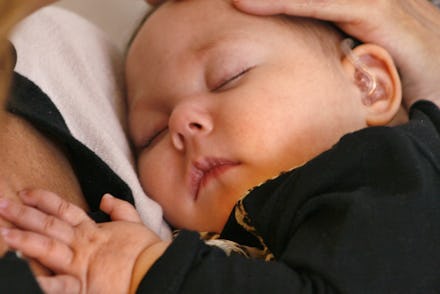The UK Just Approved Creating Babies From Three Parents

In a scientifically historic decision Tuesday, British lawmakers voted in favor of a controversial technique that uses the DNA of three people to create babies. The law is aimed at preventing potentially fatal diseases from passing on to a child, and it would make Britain the "first country in the world to allow embryos to be genetically modified," the Associated Press reports.
According to the BBC, the vote passed the House of Commons 382-128 after a debate in which Public Health Minister Jane Ellison described the technique as "light at the end of a dark tunnel" for families. The law will head to the House of Lords next for another vote, after which the first such baby could be born by next year.
The technique was specifically developed to fight mitochondrial disease, a problem inherited from the mother that can do "damage to cells of the brain, heart, liver, skeletal muscles, kidney and the endocrine and respiratory systems," according to the United Mitochondrial Diseases Foundation.
Doctors will implement a modified version of in vitro fertilization to combine the two parents' DNA with the healthy mitochondria of a donor woman:
The technique is somewhat similar to what's used to genetically modify crops. Babies would only receive 0.1% of their DNA from the donor woman and no longer be at risk of passing the disease down to future generations, according to the BBC.
This last part is what's led to some concern among opponents about the possibility of future generations of "designer babies." "If doctors start modifying some DNA to remove problems, where does it stop?" the thinking goes.
This "will be passed down generations, the implications of this simply cannot be predicted," Fiona Bruce, the MP for Congleton, reportedly said during the debate. "But one thing is for sure, once this alteration has taken place, as someone has said, once the genie is out of the bottle, once these procedures that we're asked to authorize today go ahead, there will be no going back for society."
However, the technique is likely only to be used in roughly a dozen British women with faulty mitochondria each year, reports the Associated Press. Additionally, while others have pointed to the uncertainty in this relatively new science and the advanced techniques, former Health Secretary Frank Dobson noted such uncertainty was "the nature of medicine and science."
While the law still has to go before the House of Lords, at least one major British politician is in favor of making the ground-breaking technique legal.
"I think it has be thoroughly researched and tested and as someone who had a severely disabled child myself, I know what parents go through when they are concerned about these issues," Prime Minister David Cameron told the BBC. "So science can help in this way, all the arguments are in favor, we should make sure these treatments are available."